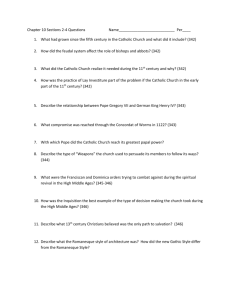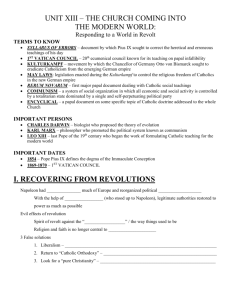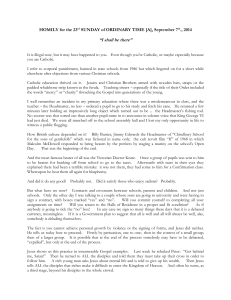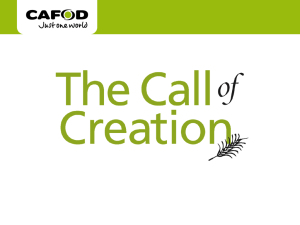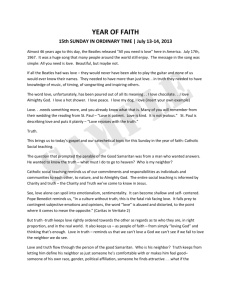Class 27 Leo XIII
advertisement
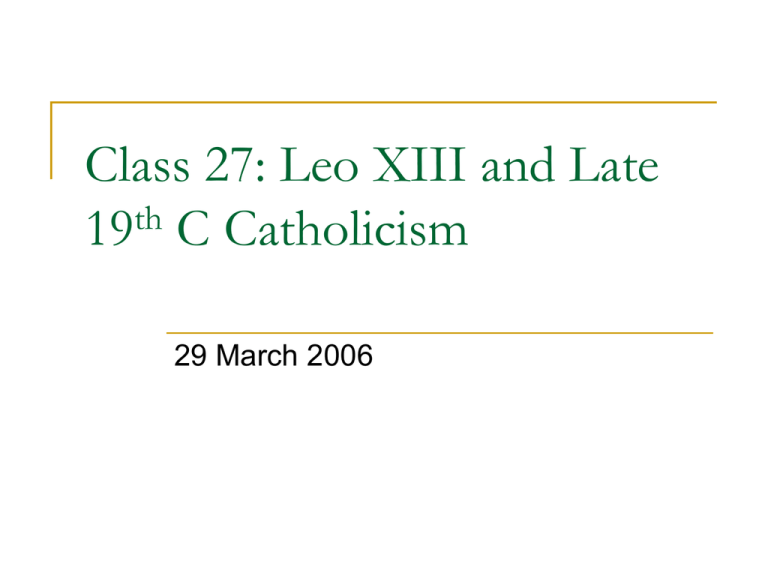
Class 27: Leo XIII and Late th 19 C Catholicism 29 March 2006 Introduction German, American, English Romanticism Henry Cardinal Newman Pope Leo XIII Catholic Modernism at end of 19th C Protestant Biblical Scholarship American Romanticism: Second Great Awakening Second Great Awakening First half 19th C (pre-Civil War) Effected all Protestant denominations Specialty was revival camp meetings led by itinerant preachers Blacks welcomed at most meetings, but not well treated afterwards Founding of A.M.E. Church, 1815 Shakers 1800, Mormons 1830 Transcendentalism The beauty of nature; man’s ability to appreciate the beauty of nature Man in beautiful because he is part of nature God in nature; not as scientific truth but as beauty Emerson, Thoreau, Alcott, Brownson, Dickinson (?) Dissident voices: Hawthorne, Melville German Romanticism Hegel (1770-1831) Christianity moves man beyond the law; Speculative Idealism Jesus brings love that restores mankind to wholeness, a holy innocence The Spirit of Christianity The Incarnation makes explicit the implicit unity of God and man; Jesus not like Socrates Christianity as revelation of Spirit Friedrich Schleiermacher (1768-1834) Influenced by Pietism in early years Religion not founded on calculating reason; nor even so much on Scripture Experience of piety is the key Does not defend relation based on moral needs of society Rejects Deist’s God of Intelligent Design Jesus Christ as the arch-type for humanity; importance of community is understanding and transmitting this spirit (truth) Immanence of God in nature English Romanticism Poets Keats (1795-1821); Shelley (1792-1822); Blake (17571827); Coleridge (1772-1834), Wordsworth (1770-1850) Romantic view of nature and human history Oxford Movement Anglican; rooted in a reaction to political and economic liberalism Recognized the pretensions of science and reason to solve all problems Opposed to Bentham and utilitarianism Opposed to Latitudinarians Opposed to Church’s increasing acceptance of secularism John Henry Cardinal Newman (18011890) Born into a family with Huguenot background; taught to read Bible as a child, but no religious training otherwise Went to Oxford in 186 as an undergraduate; Became the most important Tractarian for Oxford movement Trip to Italy and North Africa put him in touch with the ancient Church which he felt must be restored in England “Lead, kindly light” Initially, Newman sees Church of England as middle way between Catholicism and Calvinism Received into Catholic Church 1845, ordained 1847 Writes Apologia Pro Vita Sua to explain his conversion Founds an Oratory of St. Philip Neri in England Rector of Catholic University of Dublin, 1851 (Idea of a University, 1873) Made a Cardinal by Pope Leo XIII 1879 The Pillar of the Cloud, At Sea. June 16, 1833. www.newmanreader.org/works/verses/verse90.html LEAD, Kindly Light, amid the encircling gloom Lead Thou me on! The night is dark, and I am far from home— Lead Thou me on! Keep Thou my feet; I do not ask to see The distant scene—one step enough for me. I was not ever thus, nor pray'd that Thou Shouldst lead me on. I loved to choose and see my path, but now Lead Thou me on! I loved the garish day, and, spite of fears, Pride ruled my will: remember not past years. So long Thy power hath blest me, sure it still Will lead me on, O'er moor and fen, o'er crag and torrent, till The night is gone; And with the morn those angel faces smile Which I have loved long since, and lost awhile. Newman’s Thought Ecclesiology Papal Infallibility Acknowledged and accepted primacy of Pope and unwritten tradition of infallibility Had some concerns about written definition History and Dogma, Essay on the Development of Christian Doctrine Augustine’s arguments against Donatists; importance of Catholic Church Tract 90 (1841) on Thirty Nine Articles: “It is our duty … to the Catholic Church and our own to take our reformed confession in the most Catholic sense. We have no duties toward their framers” Opposed to liberal belief in progress and that there are no permanent supernatural truths Importance of apostolic Church as vessel of revealed truth Time is necessary for human mind to fully grasp the Truth; but Truth itself does not change Develops criteria for changed perspective in grasping truth opposed to heterodox developments Science Pope Leo XIII (1878-1903) Countered Bismarck’s anti-Catholic movement, Kulturkampf Known as the encyclical pontiff Rerum Novarum Providentissimus Deus Created Pontifical Biblical Commission Bismarck and Kulturkampf (War of Civilization) Bismarck (1815-1898) Kulturkampf Believed in Prussian monarchy; and unification of German Confederation under Prussia Franco-Prussian War impetus for strong confederated Germany Bismarck made Chancellor of Germany un 1870; agenda to unify in laws, customs and national spirit Germany Concern about a country within a country Relations with Papacy broken in 1870 German state passes laws against Church education; expels Jesuits; seizes Church property All clergy had to be German; educated in Germany End of Kulturkampf Formation of German Catholic political party Bismarck wanted to impose tariffs on grain and industrial goods entering Germany; in this he was opposed by economic liberals; needed Catholic support to pass economic agenda Rerum Novarum, 1891 Uphold rights of laborers to a fair wage, but also upholds right to private property Concern about poor Emphasis on common good State has the right to intervene in economy on behalf of individual and society Cornerstone of modern Catholic social teaching th 19 C Biblical Scholarship Beginning of Historical Critical Method roots in the Enlightenment Reimarus (1694-1768): Deist, roots of historical Jesus; resurrection a fraud; failure of eschaton led to Christian theology opposed to Jewish; Jesus as an apocalyptic Jewish prophet Lessing (1729-1781): Published Reimarus’s work; tries to reconcile Reimarus with Christian faith; “teachings not true because book is sacred; book is sacred because teachings are true” David Strauss (1808-1874) Life of Jesus Test historical accuracy of New Testament claims about Jesus Much mythical material in New Testament Developed rules of historical critical method Albert Schweitzer Quest for Historical Jesus 1906 Catholic Modernist Controversy Late 19th C controversy focused on relation of Biblical criticism to Catholic theology Alfred Loisy (1857-1940) The Gospel and the Church (1902) Very influential biblical Scholar Questioned authorship of Old and New Testament works Jesus as a radical eschatological Jewish prophet part of 1st C apocalypticism Christian dogma develops to meet new challenges in each age; dogmatic definitions are always relative and variable Eventually Loisy became very skeptical about Church as bearer of truth Ecclesial Reaction Pope Leo XIII, Providentissimus Deus, 1893, admitted some value to historical critical method, but not if weakened authority of Bible or Church Pope Pius X, Pascendi Dominici Gregis, 1907, condemned historical method altogether Alfred Loisy excommunicated 1907 Assignments Bokenkotter, Chapter 28 (skim only) First Vatican Council, First Dogmatic Constitution on Church of Christ, available at www.ewtn.com/library/COUNCILS/V1.HTM Leo XIII, Rerum Novarum, www.vatican.va/holy_father/leo_xiii/encyclical s/documents/hf_l-xiii_enc_15051891_rerumnovarum_en.html
